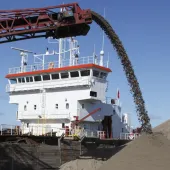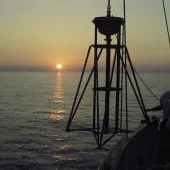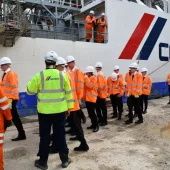
New guidance also highlights the scale of marine aggregate dredging taking place and regulations in other European countries
THE British Marine Aggregate Producers Association (BMAPA) and The Crown Estate have produced a series of regional brochures to describe the geological evolution of local coastlines, the geological origins of the offshore sand and gravel resources that are being dredged, and the influence of the modern day waves and tides on both these deposits and the coastline.
Mark Russell, director of BMAPA, said: ‘With the growing influence of climate change and extreme weather events, the profile and awareness of local coastal change has never been higher. This can sometimes lead to the view that such changes are somehow being influenced by the extraction of marine sand and gravel, despite the fact that dredging takes place in licensed areas well offshore and there are no physical processes that link it to the natural erosion of the coastline that has been occurring since prehistory.
‘Rather than representing a threat to coastlines, the marine aggregates sector plays a key strategic role responding to the challenges of natural coastal change by supplying sand and gravel to large-scale coast defence and beach replenishment projects, with more than 38 million tonnes being used for this purpose since 1990.’
He added: ‘Given the dual challenges presented by sea level rise and increased storminess, the use of marine sand and gravel for coast protection purposes is likely to become increasingly important – a fact recognized by both the Marine Policy Statement and the developing marine planning process.’
Information is also provided about the scale of marine aggregate dredging that is taking place, how the activity is assessed, regulated and monitored, and how similar activities are controlled in other European countries. In preparing these brochures, BMAPA and The Crown Estate liaised closely with representatives of the Local Government Association Coastal Special Interest Group (LGA Coastal SIG).
In terms of the assessment of marine aggregate activities, the sector remains quite clear that if extraction takes place in the wrong place or in the wrong way it could potentially result in significant local impacts. However, BMAPA say the regulatory regime that the sector operates under, together with the precautionary evidence-led processes that are adopted, mean that if there are any doubts over the significance of any impacts, either at a site specific scale or in-combination with other activities around it, the activity will not be permitted by the regulator.









